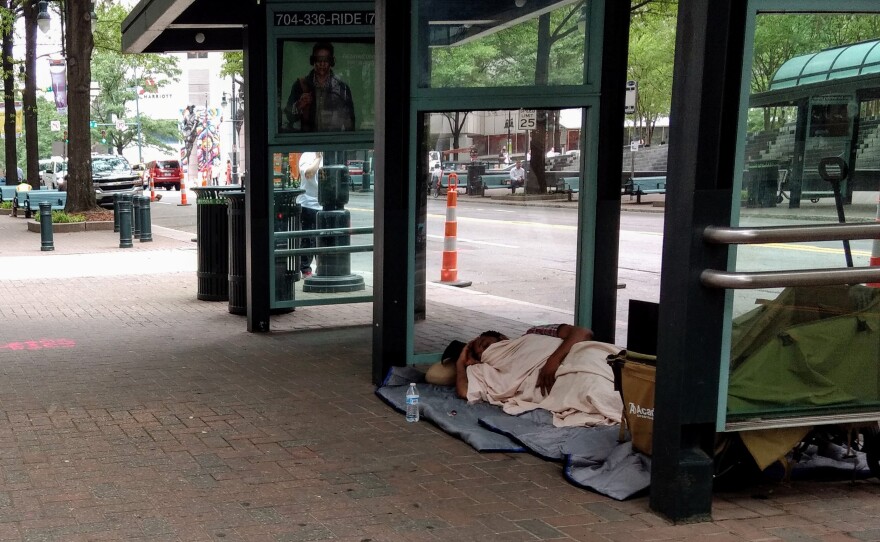A new report from Mecklenburg County calls for more coordination and resources devoted to helping those most at risk of losing their homes.

The report, titled Launch Upstream, says public and private groups should collaborate more to identify those who need help – and track how effective programs are at keeping people housed. The report includes input from local housing and support agencies.
Courtney Morton of Mecklenburg Community Support Services is a co-author.
Lisa Worf: Where are we spending money to help reduce homelessness? And where do you think we should be spending money?
Courtney Morton: So, our community has been devoting a lot of resources, attention and efforts around addressing housing instability and homelessness. And so resources are directed in both directions. What this report is trying to emphasize is how are we putting resources at the folks who are at risk of homelessness.
In general, prevention's a cost-effective solution with a high return. And so if you look at this from a moral standpoint, an economic standpoint, any other way that you approach it, it's a good thing to look at how do we invest resources upstream.
It's also a good thing for families because they are not then facing the trauma that comes with experiencing homelessness in a shelter, with getting an eviction on your record and then having to pay debts that you're going to have to then get through as you're going back and finding another place to live. Dealing with all the things that happen when you're experiencing homelessness.
Worf: After digging through the data, hearing from support agencies, what is the main point of improvement that you think we've got to do?
Morton: We do a lot of good work in our community and each agency is really doing impactful work. Where we can improve and optimize what we're doing with prevention is to tackle it as a system. And so instead of having kind of this whack-a-mole approach where we're kind of piecemealing funding sources and each agency is tackling the problem from its individual perspective, we could approach it as a system and we can align resources, increase resources, combine what financial assistance is happening over at one agency with legal assistance at another. Look at it. Advocacy across the entire umbrella, provide volunteers that are supporting more than just one agency and really combine resources and efforts in a way that looks at the entire continuum and can help resources that are being targeted downstream be more effective.
Worf: You mentioned in the report that universal risk-screening tool. How would that work? How have you seen that work in other communities?

Morton: So there's 78,000 renter households who are facing cost burden. If we were to give a $1,000 to all those 78,000 households, that would not be an efficient way to go about it. But we could apply a screening tool to find out who's most at risk of losing their housing so that we could target assistance to prevent it from when a person actually does receive their eviction notice.
Because once that happens, there's additional barriers that a household faces. There are communities that are highlighted in the report that do this that encourage folks before they get to the point where that happens that they could receive assistance for prevention.
Worf: So where would someone go to fill out this?
Morton: Sure. So one of the things we'd call out in is where would we most likely see this? And so partnering with our school systems, partnering with the other systems in our community. Where are we likely to see folks who might be experiencing housing instability? And so we're not having folks wait until the last minute to shop for housing assistance, but we're being proactive as a community to reduce the inflow into homelessness.
Worf: There certainly is collaboration going on. For example, when someone's looking for assistance, they complete a form that a bunch of agencies see. What kind of response have you been getting from agencies who are focused on homelessness and preventing it?
Morton: You know, the agencies that were part of this report were really gracious to share the things that they've learned, to share how they do things in terms of prevention assistance. They see the stories every day and so they walk that piece. I think the other response that I'd speak to is that they have great ideas for solutions. Those are highlighted in the report. And so it's not just case studies that we're seeing from other communities, but what our local agencies see as solutions for our system. And so we wanted to make sure that we we highlighted that as well.
Worf: What kind of solutions did they come up with?
Morton: So some examples are expanding existing partnerships. That's one piece. The other is looking at how do we create flexible funding sources? So current funding sources might be restricted based upon having certain time limits, making sure they're used for certain purposes. And a lot of times the problem is really gray. And so agencies have to be really creative in how they are meeting a family where they are and figuring out that solution. And funding, being flexible helps them to do that.







